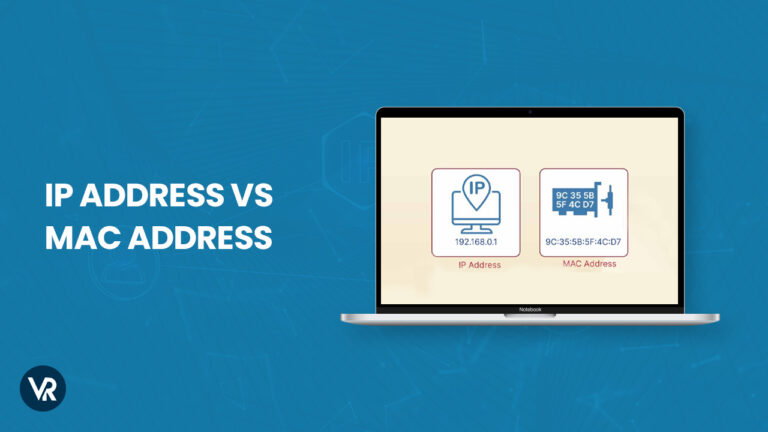
Both the IP Address vs MAC Address in Canada play crucial roles in uniquely identifying a device on the Internet, with the MAC address assigned by the Network Access Card’s manufacturer and the IP address by the Internet Service Provider (ISP). Understanding these distinctions is key: while the IP address is vital for identifying a device’s network connection, the MAC address pinpoints the device’s physical location within a network.
This distinction underscores the importance of using a VPN, like ExpressVPN, to enhance online privacy and security. The best VPN for Canada can mask your IP address, making your internet activities less traceable and bypassing geo-restrictions without altering your MAC address.
Let’s delve into the specifics of IP Address vs MAC Address and how leveraging a VPN can provide additional layers of privacy and security in the digital realm.
What is a MAC Address in Canada?
Are you wondering what is a MAC Address? A MAC address, or Media Access Control address, is a unique identifier assigned to network interfaces. This 12-digit hexadecimal number is primarily established during the manufacturing process and can be found on a device’s Network Interface Card (NIC). The MAC address is crucial in locating a device within a network and is essential for conducting network diagnostics.
What MAC address is used for? A MAC address functions within the Data Link Layer of the OSI (Open Systems Interconnection) model and facilitates direct node-to-node communication. It achieves this by incorporating the MAC addresses of both the source and destination devices within the header of each data packet exchanged.
Given that each network interface on a device possesses its own MAC address, it’s common for devices to have multiple MAC addresses. For instance, a laptop with an Ethernet port and Wi-Fi capability will display two distinct MAC addresses in its system settings, reflecting its dual interfaces. This unique addressing ensures precise identification and communication across networked devices.
What is an IP Address in Canada?
An IP address consists of four numbers separated by periods, such as 192.158.1.38, with each number ranging from 0 to 255. This format allows for IP addresses from 0.0.0.0 up to 255.255.255.255.
These addresses are systematically generated and assigned by the Internet Assigned Numbers Authority (IANA) under the Internet Corporation for Assigned Names and Numbers (ICANN). ICANN, a non-profit established in 1998 in the U.S., ensures the internet’s security and accessibility. Domain registration involves a fee paid to ICANN through domain name registrars.
Difference Between IP Address Vs Mac Address in Canada
Below is a side-by-side comparison of IP Address vs MAC Address in Canada:
| Parameters | MAC Address | IP Address |
| Full-Form | “MAC address” stands for Media Access Control Address. | “IP Address” stands for Internet Protocol Address. |
| Number of Bytes | It is a hexadecimal address of six bytes. | This address is either an eight-byte or a six-byte one. |
| Protocol Used for Retrieval | Using the ARP protocol, you can identify a device associated with a specific MAC address. | Using the RARP protocol, you can find a device linked to a particular IP address. |
| Provider | The manufacturer of NIC (Network Interface Cards) assigns the MAC address to a device. | An ISP (Internet Service Provider) assigns an IP address to a device. |
| Use | The main purpose of a MAC address is to identify the physical location of a specific device or computer. | Conversely, an IP address determines the logical address of a computer. |
| Operation | The MAC address mainly functions at the data link layer. | The IP address operates predominantly at the network layer. |
| Alteration and Changes | This address remains constant and does not change over time or with environmental changes. | This address changes based on environmental shifts and the passage of time. |
| Third-Party Access | Any third party can discover a device’s MAC address. | The IP address remains concealed and is not shown to any third parties. |
Testing methodology for IP Address Vs Mac Address in Canada
Here is how I set a testing methodology for IP vs MAC address in Canada:
- I meticulously selected reputable VPN services with strong encryption standards (AES-256 with GCM mode or higher) and transparent no-logs policies.
- I compiled a list of websites or services potentially restricted in your region to test if the VPNs could enable access.
- I ensured a stable internet connection for accurate speed testing, which is essential for evaluating performance impact.
- Upon connecting to each VPN server, I revisited the websites to determine if the displayed IP and location matched the server’s specifications.
- I conducted thorough speed tests with and without the VPNs using speedtest.net and fast.com to gauge potential speed reductions, running tests on different server locations for a comprehensive analysis.
- I used “pingometer.com” to measure ping latency with and without the VPNs, aiming for minimal impact, as high latency can severely affect real-time applications like gaming or video calls.
- I carefully verified that each VPN used robust encryption protocols, prioritizing AES-256 with GCM mode for the highest level of protection.
- I thoroughly reviewed each VPN’s logging policy, ensuring they adhere to strict no-logs policies to keep your browsing activity private.
- I tested the responsiveness and helpfulness of each VPN’s customer support to ensure you have reliable assistance whenever needed.
- I suggest considering ExpressVPN as a potential option.
What Are the Benefits of Installing a VPN on MAC and IP addresses in Canada?
Want to know what is the use of IP Address and MAC address with a VPN? Here are some highlighted benefits:
- Make your online actions private: Your browsing history, purchases made online, and location information become more difficult for websites, advertisers, and external parties to trace, enhancing your anonymity.
- Protect your identity: A VPN secures your internet connection on public Wi-Fi networks, safeguarding against snooping and potential data theft.
- Overcome regional blocks: Gain access to websites and content unavailable in your area due to censorship or licensing constraints.
- Secure your internet data: VPNs employ strong encryption methods (preferably AES-256 with GCM mode) to encrypt your online activities, offering protection from prying eyes, particularly on public Wi-Fi networks.
- Prevent man-in-the-middle attacks: VPNs establish a protected tunnel for your data, significantly reducing the risk of cybercriminals intercepting your online interactions.
- Safeguard your private information: Using a VPN provides additional security when engaging in online banking, shopping, or visiting sites that require privacy, giving you extra confidence in your online safety.
FAQs – IP Address Vs Mac Address in Canada
Does a VPN hide my IP address?
Absolutely! A VPN’s main role is to encrypt your internet traffic and direct it through a server located elsewhere. This process hides your actual IP address, making it seem as though you are accessing the internet from a different location.
What are the privacy concerns with MAC addresses?
Network administrators can monitor your device’s movement within their network using your MAC address. Additionally, some businesses gather MAC addresses to create detailed profiles based on the various devices you operate, potentially leading to more personalized advertising strategies.
Can a VPN help protect my MAC address privacy?
Although a VPN does not conceal your MAC address, it can reduce the capacity of network administrators to monitor your online actions within their network. This is achieved by limiting their visibility to only the IP address of the VPN server.
Conclusion
IP Address Vs MAC Address are fundamental to device identification and network communication, serving different functions. While an IP address identifies a device’s network connection and can change with different networks, a MAC address is a permanent hardware identifier.
ExpressVPN interacts with your device’s IP address, encrypting traffic and masking your real IP to protect online privacy. Although a VPN doesn’t change your MAC address in Canada, it significantly enhances privacy by preventing tracking based on your IP address, showcasing the importance of understanding both types of addresses in digital security.
